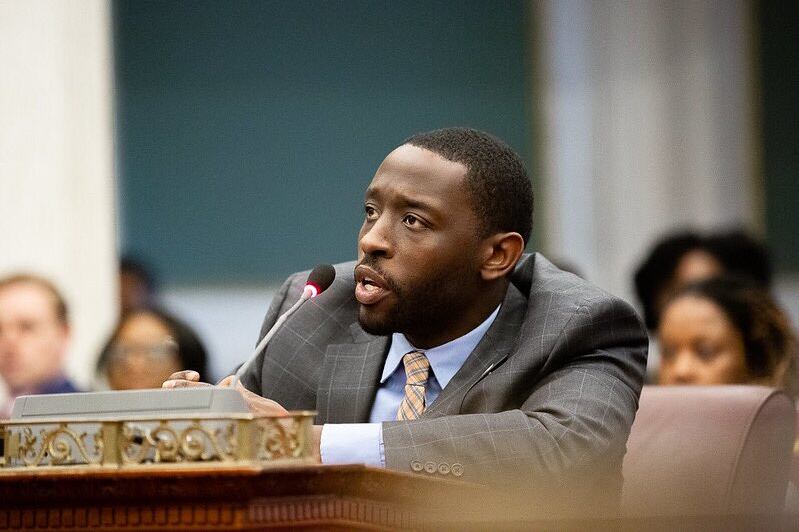Sign up for Chalkbeat Philadelphia’s free newsletter to keep up with news on the city’s public school system.
The chair of the City Council’s Education Committee wants to put the district’s process for disciplining teachers under the microscope, citing cases that drag on for months or years without being resolved.
Councilmember Isaiah Thomas introduced a resolution Thursday to hold hearings on the Philadelphia school district’s use of the “rubber room,” officially called the reassignment room, which is for teachers who have been accused of misconduct and are removed from their classrooms.
Thomas told his colleagues that teachers in the rubber room receive full salary and benefits, while the district must also pay substitutes who may or may not be properly credentialed.
“We want to examine how much money we’re wasting,” he said. Thomas’ resolution was adopted by voice vote.
He said the system lacks transparency, and that some teachers stay in the rubber room even after they’re cleared by the city’s Department of Human Services, which investigates cases involving alleged mistreatment of children, while the district’s own procedure drags on.
Thomas said he decided to take action after receiving complaints from people caught up in the system, including one person who has been in the rubber room for two-and-a-half years.
Teachers can be sent to the rubber room — sometimes also known as “teacher jail” — for allegations involving everything from sexual harassment of colleagues and inappropriate relationships with students, to having a public meltdown in school and saying something in class that a student, or their parent, found inappropriate. With some cases coming down to a teacher’s word against a student’s, investigations can often be difficult and take time.
Thomas said in an interview that he is not trying to pass judgement on the validity of individual cases.
“I don’t think our issue is examining why people are in there,” he said. “The ‘why’ is not within our jurisdiction. We’re concerned about the system that is in place, how long people are there, the lack of efficiency as it relates to money wasted. The most important thing is the academic achievement gaps that it creates for our students.”
District spokesperson Monique Braxton said that there are currently 66 people in the rubber room — actually a series of rooms — at the district’s headquarters. There’s one for teachers, one for principals, and one for paraprofessionals including climate staff.
Braxton said she could not offer any statistics on the average length of stay, or on how many district employees are ultimately cleared. Thomas’s resolution says “it appears that several hundred” district employees spend some time in the rubber room each year. Braxton said “that number is incorrect” based on the information she has, but did not provide an alternative figure.
“We welcome the collaboration with members of Philadelphia City Council in educating our students and doing what is best for our invaluable employees,” she said in a statement reacting to the hearings. “Our doors are always open.”
The district’s contract with the Philadelphia Federation of Teachers says that any disciplinary actions against the union’s members has to follow provisions of the state school code, and that disciplined teachers may choose to file a grievance against the district.
Although some other teachers’ contracts require a time limit on disciplinary actions, Philadelphia’s does not. The district and the union are negotiating a new contract this year; the current pact expires on Aug. 31.
It’s unclear exactly how much it costs the district to provide salaries and benefits to educators who are in the rubber room and therefore not working their regular jobs in schools and classrooms. The average yearly cost of a Philadelphia teacher, including benefits, is about $120,000. But in a district that’s been historically underfunded and struggles with everything from large class sizes to older buildings, such costs can come under increased scrutiny.
Under the district’s disciplinary process, a complaint that could lead to an educator being placed in the rubber room must first be investigated at the school level, and then, if officials determine to be valid, passed on to the district’s Labor Relations office. That office must also determine whether the alleged conduct could constitute a violation of federal Title IX law.
In response to Thomas’s resolution, Philadelphia Federation of Teachers President Arthur Steinberg issued a statement saying that the union “is strongly in favor of attacking bureaucratic inefficiencies … in order to free precious resources that could be redirected into classrooms.”
He added that union officials “look forward” to testifying on the matter.
At the hearing, which has yet to be scheduled, Thomas said he wants to hear from teachers sent to the reassignment room, Department of Human Services officials who investigate complaints, district staff who manage the process, Superintendent Tony Watlington, and union officials.
He said he wants to use the hearing “to determine the best way to manage cases and incidents in a way that ensures safety, manages taxpayer dollars effectively and is transparent to staff sent to the reassignment rooms.”
Dale Mezzacappa is a senior writer for Chalkbeat Philadelphia, where she covers K-12 schools and early childhood education in Philadelphia. Contact Dale at dmezzacappa@chalkbeat.org.






